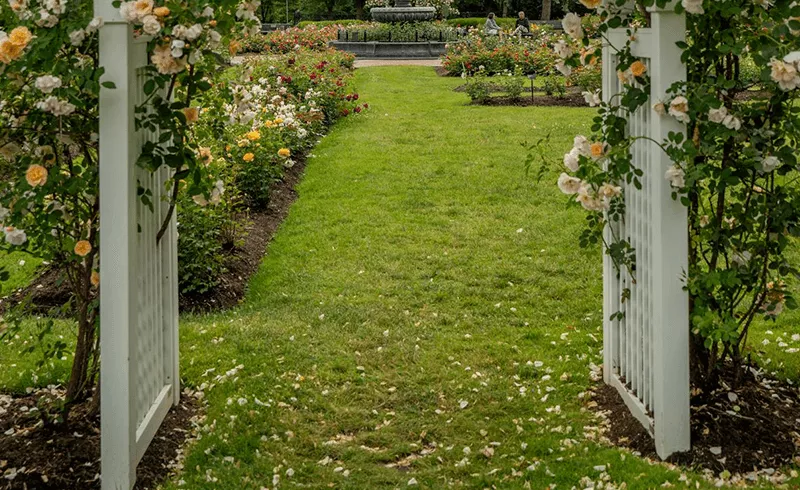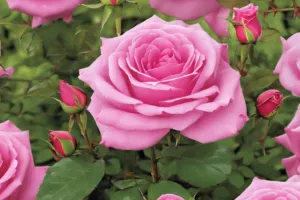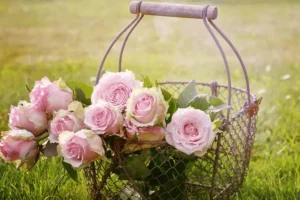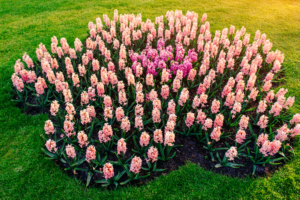
Roses, with their captivating beauty and intoxicating aroma, have charmed gardeners and flower enthusiasts since time immemorial. Tradition may suggest that roses are best suited to formal gardens.
Still, the idea of incorporating these magnificent blooms into our everyday lawns can be as appealing as it is intriguing. So, this brings us to an important question—is it genuinely feasible to plant roses on a lawn? The short answer is yes, but it’s a task that demands the right knowledge, careful consideration, and meticulous execution.
Understanding Roses
Understanding roses’ specific needs is crucial before integrating them into your lawn. Roses require at least six hours of full sunlight daily for optimum growth. They also require soil with good drainage, as standing water can lead to diseases like root rot. Furthermore, roses need routine maintenance, such as pruning and feeding nutrients via fertilizers.
Choosing the Right Varieties
Not all roses are cut out for life on a lawn; some varieties are more suitable for this purpose than others. For example, landscape or shrub roses are hardier types that grow wider rather than taller, making them ideal choices for your lawn’s parameters or open spaces. On the other hand, climbing varieties could adorn fences or arches bordering your lawn.
Planting Roses Correctly
Location matters significantly when planting roses on a lawn. Ensuring the grass and roses receive optimum sunlight exposure without infringing on each other’s needs is essential. Also crucial is maintaining enough distance between rose plants to allow them space to grow.
Rose bushes should be planted in large holes filled with compost-rich soil, which will nourish them as they establish themselves. Mixing bone meal into the soil can improve fertility by providing phosphorus that aids root development.
Maintaining Lawn Harmony
Introducing a new species into an existing ecosystem, like a lawn, can potentially disrupt its harmony. For instance, roses need regular watering, but overwatering can cause damage to your grass. Likewise, specific fertilizers useful for roses may detrimentally affect the grass.
One way around this is mulching – applying a layer of organic material around the base of your roses. Mulch benefits in various ways; it reduces water evaporation from the soil surface, suppresses weed growth, and gradually decomposes, providing nutrients to the roses and improving overall soil condition.
Tackling Pest Problems
Pests attracted to roses may also threaten your lawn’s health. Common pests like aphids and black spot fungus can potentially spread onto the grass. Regular inspections and prompt treatments using suitable methods, eco-friendly pesticides, or homemade remedies like soap solutions are advisable.
The Balance Between Aesthetics and Functionality
While it is aesthetically pleasing to have roses in full bloom dotting your lawn or gracefully bordering it, one should remember that a lawn is often a functional part of our homes, too. Children can run and play on it, families can host vibrant picnics there, and it often becomes a beloved playground for pets. Therefore, incorporating thorny plants requires careful planning so they do not pose safety hazards.
Planting roses on your lawn is achievable with ample clarity about their needs and appropriate care routines. It balances artful aesthetics and thorough science – an endeavor that demands patience but rewards exceptional results.
Roses symbolize love and passion, but planting them isn’t an act driven by impulse; instead, it necessitates a love for gardening channeled through thoughtful planning and sustained efforts. If you deem this effort worthwhile, sprinkling your green carpet with these spectacular blossoms can redefine its beauty.

Bob Green, a passionate lawn care enthusiast with over two decades of landscaping experience, is this website’s proud owner. His vast knowledge of horticulture and dedication to helping homeowners maintain beautiful lawns are reflected in the valuable content he shares on his platform. John has always been interested in Agrostology.











